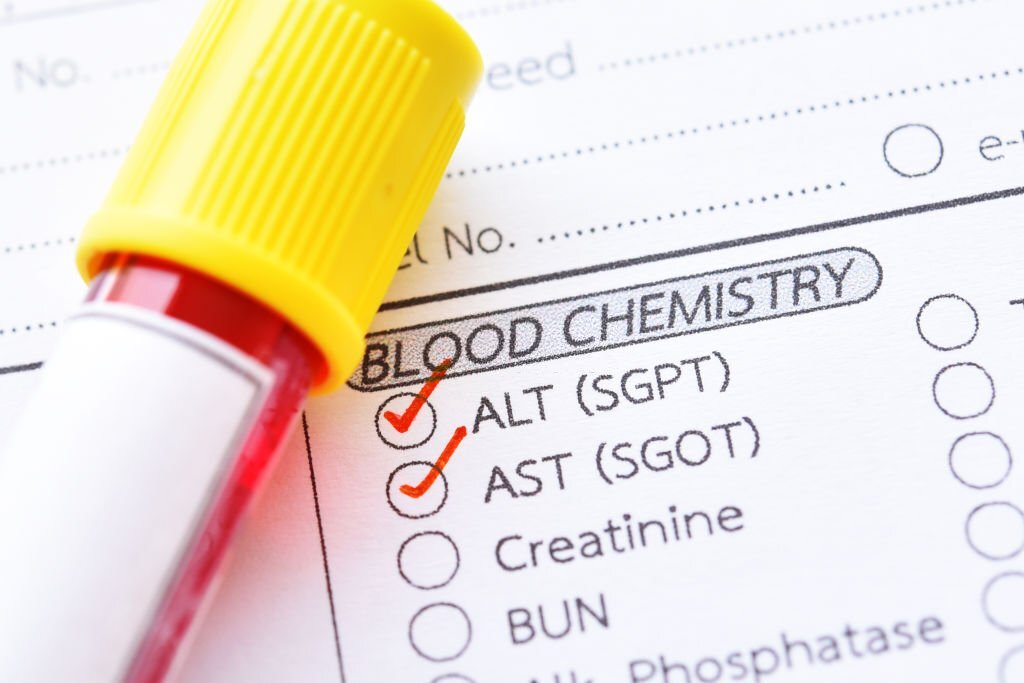
The liver is a crucial body part that controls many body functions. When the liver gets hurt, it can affect your health. In our country, liver problems are common. One way to check your liver’s health is through a liver blood test. SGPT is an essential part of this test, and it tells us if the liver is working well. So, let’s learn more about SGPT.
This article explains the SGPT liver blood test, what’s normal, what high ALT levels mean, and what causes it and its symptoms.
SGPT Test:
The SGPT test, or Serum Glutamic Pyruvic Transaminase test, checks the level of an enzyme called GPT in your blood. GPT is produced by different cells in your body, like those in your heart, kidneys, liver, and muscles. But the test is most commonly used to monitor your liver’s health. This test is simple and painless, with only a momentary pinch when the doctor takes a small blood sample from your arm.
What is SGPT?
SGPT, also known as Serum Glutamic Pyruvic Aminotransferase or ALT, is an enzyme that belongs to a group of enzymes called aminotransferases. These enzymes help with chemical reactions where an amino group moves from one amino acid to another molecule.
Why Do a Liver Blood Test?
A liver blood test, like the SGPT test, is done to check how well your liver is working and to detect any damage or injury. Normally, liver enzymes are inside liver cells and aren’t found in high amounts in the blood. If there’s a high concentration of these enzymes in the blood, it might signal a problem with your liver.
The Normal Range in SGPT Test
The usual ALT levels can differ based on where you get the blood test. On average, a Sgpt test normal range falls between 7 to 56 units per liter of serum. When your SGPT levels in a liver blood test go beyond 56 units per liter, it’s considered as a high level, which might suggest potential liver injury or damage.
Common Causes of High SGPT in Liver Blood Tests
Elevated SGPT levels can point to liver damage or inflammation. Here are some usual reasons for high SGPT levels:
Hepatitis: Hepatitis B and C, viral infections, can harm the liver and raise SGPT levels.
Alcohol: Drinking too much and for a long time can lead to liver inflammation and damage, showing as high SGPT levels.
Medications: Some medications processed by the liver can harm it, causing drug-induced liver injury and raising SGPT levels. This might include drugs like statins, antibiotics, or acetaminophen.
Cirrhosis: Advanced liver scarring, known as cirrhosis, often results from long-term damage due to issues like chronic alcohol use, viral hepatitis, or fatty liver disease, causing high SGPT levels.
Muscle Damage: SGPT also exists in muscles, so problems that damage muscles, like intense exercise, muscle diseases, or injuries, can temporarily increase SGPT levels.
Heart-Related Problems: Certain heart issues, such as congestive heart failure or heart attacks, can reduce oxygen supply to the liver, leading to liver cell damage and higher SGPT levels.
Diabetes: People with diabetes may experience elevated SGPT levels.
Obesity: Being significantly overweight can also contribute to high SGPT levels.
Gallbladder Inflammation: Cholecystitis, or inflammation of the gallbladder, is another potential cause.
Infectious Mononucleosis: Glandular fever caused by the Epstein Barr virus may affect SGPT levels.
Dermatomyositis: Inflammation of the skin and muscles, known as dermatomyositis, can lead to high SGPT levels.
What are the Signs of High SGPT Levels?
High SGPT levels don’t always come with noticeable symptoms in the early stages. SGPT is an enzyme in the liver cells, and its rise often indicates liver cell damage or inflammation. Many people with high SGPT levels may not feel any different. However, in advanced stages, you might experience:
- Tiredness
- Weakness
- Nausea
- Vomiting
- Shortness of breath
- Swelling in legs
- Jaundice
- Excessive bleeding
- Abdominal discomfort
- Weight loss
- Changes in stool colour
Since high SGPT levels might not show clear symptoms, it’s important to regularly check with liver function tests (LFT test). These tests can detect liver problems early, even before you notice any symptoms. Remember, SGPT test high means keeping a close eye on your liver’s health.
Tips for Preventing High SGPT Levels
Avoiding high SGPT levels involves making healthy choices and safeguarding your liver.
Here are some steps to lower the risk of liver damage and elevated SGPT:
- Limit alcohol intake to protect your liver.
- Use medications carefully and discuss side effects with your doctor.
- Consider hepatitis vaccination if you’re at risk.
- Maintain a healthy weight through diet and exercise.
- Choose a diet rich in fruits, vegetables, whole grains, and lean proteins.
- Engage in regular physical activity to support liver health.
- Stay hydrated to aid liver detoxification and overall well-being.
To keep your liver healthy and prevent high SGPT levels, follow these tips. And remember, if you want to know how to reduce SGPT quickly, it starts with a healthy lifestyle.
Conclusion:
Understanding the normal range and the potential reasons for high SGPT levels is essential. If your SGPT levels are elevated, making lifestyle changes such as limiting alcohol, adopting a healthy diet, and staying active can help reduce SGPT levels over time. And if you’re in Kolkata, you can easily get an SGPT test done at a reliable diagnostic centre in Kolkata & Bhopal like Health Care Diagnostic Clinic & Laboratory Services. Your liver health is crucial, so take the necessary steps to keep it in check!


